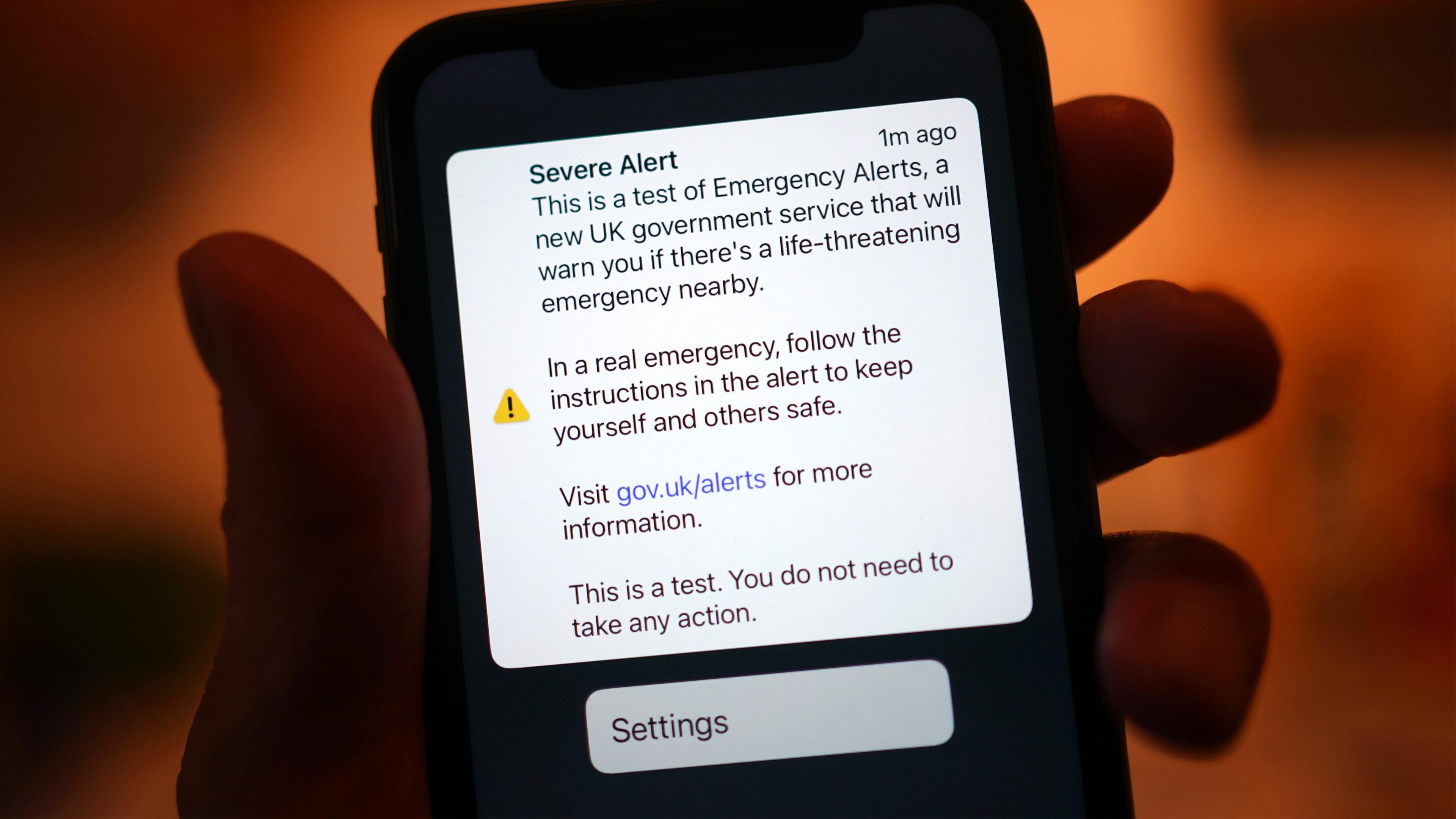Emergency alert to be sent to smartphones in UK test
Watch UK alert go off from a government test in 2023
- Published
The national system for sending emergency alerts to mobile phones in the UK will be tested again this September, the government has said.
It will see compatible phones vibrate and make a siren sound for 10 seconds while displaying a message at 15:00 BST on 7 September, even if they are set to silent.
The alerts are intended for situations in which there is an imminent danger to life, such as extreme weather events or during a terror attack.
Though the system has been deployed regionally five times in the past few years, a previous nationwide test in 2023 revealed technical issues - with some people receiving the alert earlier than expected and some not receiving it at all.
Many on the Three network did not get anything, along with users on other networks - while some received multiple alerts. The government later said the message did not reach around 7% of compatible devices.
The Cabinet Office said at the time that the problems uncovered would be reviewed and addressed ahead of another test.
It said September's test was intended to ensure the system worked well and to make sure people were familiar with the alerts, in line with other countries that also use them, like the US and Japan.
Of the approximately 87 million mobile phones in the UK, the alert will only appear on smartphones on 4G or 5G networks. Older phones, and phones connected to 2G or 3G networks, will not receive the message.
Cabinet Office minister Pat McFadden said: "Just like the fire alarm in your house, it's important we test the system so that we know it will work if we need it."
Addressing MPs in the House of Commons on Tuesday, McFadden said the alert system "will play a critical role in making sure that we are ready for all kinds of future emergencies".
But some MPs highlighted concerns that text alerts and web information could fail to reach some citizens.
Liberal Democrat MP Sarah Olney said they could miss "millions of people - people without phones, without signal, without battery".
Stafford MP Leigh Ingham meanwhile asked the government for assurances that the alert would reach rural constituents.
McFadden said roughly 95% of the UK population is covered by 4G or 5G access, and the government is working "constantly" with telecom providers to improve it.
When is the emergency alert test and how can you opt out?
- Published7 September

A previous national test took place in April 2023
The system was used to send alerts to 4.5 million phones in Scotland and Northern Ireland during Storm Eowyn in January 2025, and 3.5 million in England and Wales during Storm Darragh the previous month.
It was also used to aid the evacuation of more than 10,000 residents in Plymouth as an unexploded 500kg World War Two bomb was carefully removed and taken out to sea to be detonated after being uncovered.
Tracey Lee, chief executive of Plymouth City Council, said it had been an "invaluable tool" and provided residents with "clear information at a critical moment".
While devices that are not connected to mobile data or wi-fi will still receive the alert, those that are switched off or in airplane mode will not.
Domestic abuse charities previously warned the system could endanger victims by potentially alerting an abuser to a hidden phone. The National Centre for Domestic Violence advised people with concealed phones to turn them off for the duration of the test.
The government stresses that emergency alerts should remain switched on, but has published a guide, external for domestic abuse victims on how to opt out.
A public information campaign will be run ahead of the test to notify people that it will be taking place.
Communications will be targeted at vulnerable groups, such as victims of domestic abuse, and products in British Sign Language will also be used in the campaign.